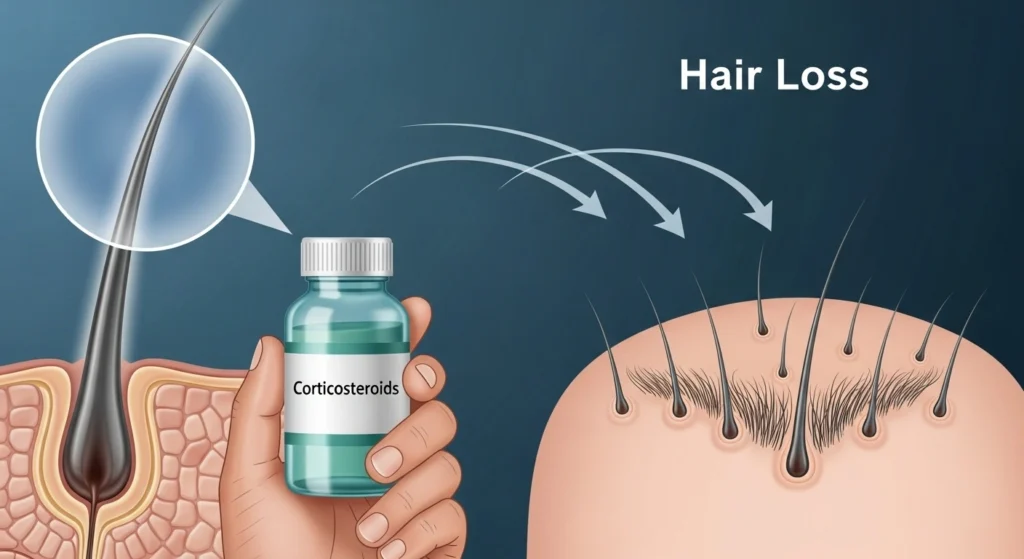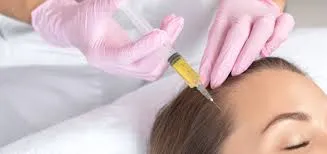Summary
Can Corticosteroids Cause Hair Loss? Corticosteroids, commonly used to treat various conditions, can cause hair loss in some individuals, primarily through a condition called telogen effluvium. The risk of hair loss increases with the dosage and duration of steroid use.
While this type of hair loss is usually temporary, it can be managed by adjusting the steroid dose, using hair care treatments, and consulting a healthcare provider. Understanding how corticosteroids can affect hair health is key to minimising their impact.
Introduction
Corticosteroids are often prescribed to treat a variety of health conditions, from autoimmune diseases to skin allergies. However, many individuals who take these medications wonder if they could be contributing to hair loss.
In this article, we’ll explore the relationship between corticosteroids and hair health, explain how these medications can lead to hair thinning, and provide practical tips for managing hair health while using corticosteroids. By the end, you’ll understand how to prevent or address hair loss during steroid treatment.

What Are Corticosteroids and How Do They Affect the Body?
Definition and Types of Corticosteroids
Corticosteroids are synthetic drugs that mimic the effects of hormones your body naturally produces in the adrenal glands, such as cortisol. These medications are typically prescribed to manage inflammation, allergies, and autoimmune diseases. There are two main types:
- Glucocorticoids: Used primarily for their anti-inflammatory properties. Examples include prednisone and hydrocortisone.
- Mineralocorticoids: Primarily used to regulate salt and water balance in the body.
How Corticosteroids Work in the Body
Corticosteroids work by suppressing the immune system and reducing inflammation. While they are incredibly effective in managing conditions like arthritis, asthma, and eczema, they can also come with a range of side effects, including hair loss.
Common Uses of Corticosteroids in Treatment
- Autoimmune diseases (e.g., lupus, rheumatoid arthritis)
- Skin conditions (e.g., eczema, dermatitis)
- Respiratory conditions (e.g., asthma, COPD)
- Inflammatory diseases (e.g., Crohn’s disease, ulcerative colitis)
Short-Term vs. Long-Term Use of Corticosteroids
The risk of side effects, including hair loss, generally increases with long-term use of corticosteroids. Short-term use for acute conditions may have fewer risks, but can still cause temporary hair thinning.
Can Corticosteroids Cause Hair Loss?
Understanding the Mechanism Behind Hair Loss
Corticosteroids can influence hair growth by interfering with the normal hair growth cycle. These medications may trigger telogen effluvium, a condition where hair prematurely enters the shedding phase. This results in noticeable hair thinning or shedding.
Impact of Corticosteroids on Hair Follicles
The active components in corticosteroids can affect hair follicles, potentially leading to slower hair growth and weaker hair strands. The hair loss is often temporary, but in some cases, it can be permanent if corticosteroids are used for long periods.
Types of Hair Loss Associated with Corticosteroids
- Telogen Effluvium: This is the most common type of hair loss associated with corticosteroids. It causes widespread shedding of hair without the formation of bald patches.
- Androgenetic Alopecia: Long-term steroid use can sometimes exacerbate this hereditary type of hair loss, particularly in individuals already prone to it.
What Factors Determine Whether Corticosteroids Will Cause Hair Loss?
Dosage and Duration of Steroid Use
The higher the dose and the longer the corticosteroids are used, the higher the likelihood of side effects like hair loss. Individuals on long-term steroid therapy are at a greater risk.
Systemic vs. Topical Corticosteroids
Systemic corticosteroids (oral or injected) have a more significant impact on hair health than topical treatments (creams or ointments). While topical steroids are less likely to cause systemic side effects, they can still trigger hair thinning in some cases.
Underlying Health Conditions and Other Medications
Certain health conditions, such as autoimmune diseases, may contribute to hair loss, even without corticosteroid use. Additionally, combining corticosteroids with other medications like blood thinners can increase the risk of hair thinning.
The Role of Genetics in Corticosteroid-Induced Hair Loss
Your genetic predisposition plays a key role in whether corticosteroids will cause significant hair loss. Those with a family history of hair loss may experience exacerbated symptoms.
Are There Ways to Prevent or Minimise Hair Loss While Using Corticosteroids?
How to Manage Side Effects During Steroid Use
- Monitor your dosage: Lowering the steroid dose, if possible, may help reduce the risk of hair loss.
- Use corticosteroids intermittently: Using steroids only when necessary can minimise their impact on hair health.
Hair Care Tips for Steroid Users
- Gentle hair care: Avoid tight hairstyles and reduce heat styling. Use a mild shampoo and conditioner to prevent additional stress on your hair.
- Avoid harsh chemicals: Minimise the use of chemical treatments like dyes or perms that can exacerbate hair thinning.
Alternative Treatments and Supplements to Support Hair Health
Certain vitamins and supplements, such as biotin, vitamin D, and zinc, can help improve hair health and prevent excessive shedding. Consult your doctor before adding any new supplements to your routine.
What to Do If You Experience Hair Loss from Corticosteroids?
How to Address Hair Loss with Your Doctor
If you notice hair thinning or shedding, it’s essential to discuss this with your healthcare provider. They may adjust your corticosteroid dosage or recommend treatments to help prevent further hair loss.
Potential Treatments for Steroid-Induced Hair Loss
- Topical Minoxidil: A common treatment for hair loss that can help stimulate hair growth.
- Platelet-Rich Plasma (PRP): PRP therapy involves injecting your own platelets into the scalp to promote hair regrowth.

When to Consider Stopping Corticosteroid Treatment?
If hair loss becomes severe or is not manageable, you and your doctor may need to explore other treatment options. Never stop corticosteroid use abruptly without consulting a medical professional.
FAQs About Corticosteroids and Hair Loss
Can hair grow back after corticosteroid-induced hair loss?
What are the alternatives to corticosteroids for treating autoimmune conditions?
How long does it take for hair to regrow after stopping corticosteroids?
Are there specific types of corticosteroids that cause more hair loss than others?
Next Step
Book a consultation with Dr Rana Irfan in Islamabad today to ensure a smooth and successful recovery after your hair transplant. Get personalised advice on managing hair health while on corticosteroids.
